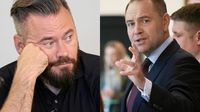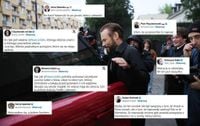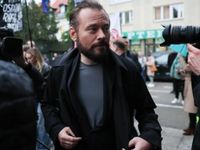On the evening of May 9, 2025, a presidential debate took place, organized by conservative stations TV Republika, wPolsce24, and Trwam. This debate was notable for its unique format, as the first round featured questions posed not by journalists, but by a panel of experts including InPost CEO Rafał Brzoska, constitutional law expert Professor Ryszard Piotrowski, and Łukasz Jankowski, the President of the Supreme Medical Council. The event was marked by the absence of significant candidates; Rafał Trzaskowski and Magdalena Biejat did not participate, and Maciej Maciak was not invited.
During the debate, Krzysztof Stanowski, a prominent journalist and head of Kanał Zero, made an appeal to presidential candidate Karol Nawrocki, urging him to organize a serious press conference to clarify various issues surrounding his candidacy. Stanowski's call for transparency came amid rising scrutiny and controversy regarding Nawrocki's financial dealings.
The day after the debate, Stanowski shared a personal encounter he had with Nawrocki, which he described as a significant moment. He recounted how, after navigating through a crowd of supporters shouting the names of various candidates, he found himself in his car when Nawrocki approached him. Stanowski humorously asked if he should give Nawrocki a ride, to which Nawrocki suggested that perhaps holding a press conference would indeed be a good idea.
In a moment that Stanowski found particularly striking, Nawrocki asked him, "But tell me... You’ve lost faith in me, haven’t you?" Stanowski admitted he had some doubts, prompting Nawrocki to request that Stanowski consider whether he would have signed a certain document in 2021 if he had been a tenement house cleaner, further insisting, "Don’t doubt me. Please." Stanowski later reflected on this interaction, stating, "I will remember this because it moved me. There was no arrogance in Nawrocki's eyes, no pretense. Just a sincere sadness that he had lost face in front of another person."
This human moment in politics resonated with Stanowski and highlighted the emotional stakes involved in the campaign, as Nawrocki's plea seemed genuine and unforced, contrasting sharply with the typical theatrics of political debates.
However, the controversy surrounding Nawrocki continued to unfold. On May 5, 2025, the news portal Onet published an article revealing that Nawrocki owned two apartments, including a 28 m² studio, which was suggested to have been acquired under dubious circumstances. In response, Nawrocki clarified his relationship with Jerzy Żywicki, the previous owner of the studio, detailing how he had acquired the property through a lifetime annuity agreement. Nawrocki's campaign team presented Żywicki's will and the notarial act to substantiate the legitimacy of the transaction, stating that the apartment would be used for charitable purposes.
Despite these explanations, the political atmosphere remained charged. Szymon Hołownia, another candidate, raised concerns about Nawrocki's dealings during the debate, further fueling the fire of public scrutiny. The media, particularly outlets aligned with the opposition, continued to question Nawrocki's integrity and the circumstances of his property acquisitions.
As the election campaign progressed, the narrative surrounding Nawrocki grew increasingly complex. Stanowski's account of his interaction with Nawrocki post-debate was shared widely on social media, sparking a mix of support and skepticism among the public. Some commentators accused Stanowski of being manipulated by Nawrocki, suggesting that the candidate's emotional appeal was a calculated move to distract from the serious allegations against him.
Critics pointed out that while Nawrocki's plea for understanding was heartfelt, it did not address the substantive issues raised regarding his financial ethics. The backlash included accusations that Nawrocki had exploited an elderly neighbor for personal gain, with some online commentators suggesting that he was responsible for the neighbor's subsequent placement in a care home.
Amidst this turmoil, the debate itself served as a microcosm of the larger electoral struggle, showcasing not only the candidates' policies but also their personal narratives and the public's perception of their character. The interaction between Stanowski and Nawrocki highlighted the human element often overshadowed by political rhetoric, illustrating the emotional weight candidates carry as they navigate public scrutiny.
As the election date approaches, the stakes for Nawrocki and his campaign are higher than ever. With his integrity and character under intense scrutiny, the outcome of this election will not only determine his political future but also serve as a litmus test for the electorate's tolerance for controversy in their leaders. Voters will have to weigh Nawrocki's personal appeals against the backdrop of serious allegations and the broader implications of his candidacy for Poland's political landscape.
In the world of politics, where public perception can shift rapidly, the events surrounding Karol Nawrocki provide a compelling narrative of ambition, vulnerability, and the complex interplay of personal and political dynamics. The coming weeks will be crucial as the candidates continue to engage with the electorate, and the public's response to these unfolding events will shape the future of Polish politics.



